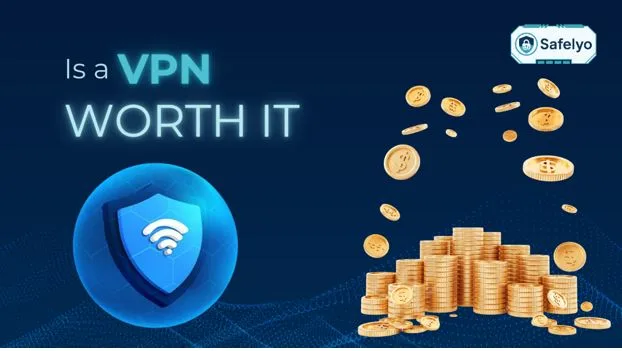Is a VPN worth It? How to decide if it’s the right choice for you
Wondering is a VPN worth it in today’s digital world? With cyber threats on the rise, advertisers tracking your every move, and streaming platforms locking content by region, it’s no surprise VPNs have become one of the most talked-about privacy tools.
Still, the truth is that a VPN isn’t a magic fix for everyone and knowing when it adds real value is just as important as understanding what it does. Personally, I’ve found that using a VPN not only gave me more control over my privacy but also opened up access to shows and services I couldn’t get otherwise.
In this guide, you’ll discover:
- How a VPN works and the key benefits it can bring to your online experience
- Common situations where using a VPN may have little impact or even create drawbacks
- How to choose a reliable, secure VPN provider that matches your needs and budget
By the end, you’ll have a clear, balanced view of whether a VPN is a smart investment for your privacy, security, and digital freedom or if it’s simply an extra tool you can live without.
1. Is a VPN worth it?
Many people ask is a VPN worth it when deciding whether to subscribe to a service. The short answer is: yes, for most users who value privacy, security, or online freedom, a VPN can be worth it. It protects your data on public Wi-Fi, hides your IP address, and lets you bypass geo-restrictions, making it useful for both security and entertainment purposes. For casual browsing at home, it may be less essential, but the extra protection can still be beneficial.
2. Why a VPN is worth it?
Understanding the concrete benefits helps answer is a VPN worth for your situation. Below are the main advantages and practical examples of when they matter most.
2.1. Protects your online privacy from ISPs and trackers
A VPN prevents your ISP and many ad networks from easily linking your browsing to your real IP address. While it doesn’t make you anonymous, it makes large-scale tracking and profiling harder and reduces how much of your web activity is tied to you.
2.2. Secures data when using public Wi-Fi
Public hotspots in cafés, airports, or hotels are attractive targets for attackers using “man-in-the-middle” tactics. A VPN encrypts your traffic end-to-end, so even if someone captures packets on the same network, the data is unreadable without the proper keys.
2.3. Bypasses geo-restrictions for streaming and content access
A VPN lets you appear to be in another country by connecting through remote servers, which is useful for accessing regionally restricted streaming libraries or websites. This is why many travelers and expatriates use VPNs to watch services from home.
2.4. Prevents targeted ads and data profiling
By hiding your IP and making your traffic look like it originates from a VPN provider, you reduce the effectiveness of ad networks that compile profiles based on IP location. This doesn’t eliminate advertising but makes highly targeted tracking more difficult.
2.5. Helps avoid bandwidth throttling by ISPs
Some ISPs throttle traffic types like streaming or torrenting during peak times. Because a VPN hides the type of traffic from your ISP, it can sometimes avoid automatic throttling rules and maintain more consistent speeds for certain services.
3. When a VPN may not be worth it?
Understanding the limitations is just as important as recognizing the benefits. In some cases, a VPN may offer minimal advantage and could even create inconveniences that outweigh its benefits.
3.1. Possible internet speed reduction
Encryption and rerouting add overhead. If you connect to a distant or overloaded VPN server, you may see slower download speeds and higher latency, noticeable in gaming or large uploads. Choosing nearby, well-resourced servers and modern protocols reduces this impact, but it can’t be eliminated entirely.
3.2. Extra cost if you rarely need online privacy
If your online habits are low-risk (reading news, light browsing) and you don’t use public Wi-Fi or sensitive services, paying for a VPN may not be cost-effective. Infrequent users can consider occasional manual solutions like secure HTTPS sites or using a trusted proxy.
3.3. Not a complete solution against malware or phishing
A VPN secures your connection but does not scan or remove malware, nor does it make you immune to phishing pages. You still need antivirus software, browser vigilance, and good security practices to remain safe.
3.4. Limited usefulness for non-sensitive browsing
For tasks that don’t involve personal data, viewing public websites or streaming free content available in your region, the benefits of a VPN are marginal. In those cases, the extra configuration and potential speed trade-offs may outweigh the advantages.
4. Free vs paid: is it worth paying for a VPN?
When you decide a VPN is useful, the next question is usually whether to pick a free or paid service. The answer influences security, speed, and long-term value.
4.1. Risks of using a free VPN
Many free VPNs limit bandwidth, throttle speeds, force ads, or log user data for monetization. Some free offerings have been known to sell aggregated user data or inject tracking in other ways, which defeats the privacy purpose of a VPN.
4.2. Advantages of paid VPN services
Paid VPNs typically offer faster servers, better global coverage, stronger encryption options, a clear no-logs policy, and features like kill switches and multi-device support. They also tend to provide faster customer support and regular security audits, making them more reliable for privacy-minded users.
4.3. Cost vs value comparison
Monthly VPN plans are relatively inexpensive compared with the cost of identity theft or frequent data breaches. If you regularly access public Wi-Fi, stream region-restricted content, or require privacy for work, the subscription cost is often justified. Look for money-back guarantees or trial periods to test performance before committing.
5. Trusted VPN providers worth considering
Choosing a reputable VPN provider is crucial, as the benefits you get from the service depend greatly on its reliability and transparency. At Safelyo, we aim to guide users toward smart, secure choices, and our Chief Technology Officer, Michale Dang, often emphasizes that a VPN’s value lies in both its protection and the integrity of the company behind it.
With years of privacy testing expertise, Michale has reviewed countless services and highlights a few trusted options that consistently deliver strong security, fast speeds, and user-friendly experiences.
5.1. NordVPN: strong security features and global coverage
NordVPN is known for a large server network, strong encryption, and features like double VPN and obfuscated servers. These options help users who need extra privacy or want to bypass restrictive networks.
5.2. ExpressVPN: fast speeds and reliable streaming access
ExpressVPN often ranks highly for speed and consistent ability to access streaming libraries across regions. It’s a solid choice if you prioritize performance for video and gaming while still getting robust privacy protections.
5.3. Surfshark: budget-friendly with unlimited devices
Surfshark offers competitive pricing and lets you connect many devices under one subscription, which is great for families or users with many gadgets. It typically includes useful extras like ad-blocking and multi-hop connections.
5.4. CyberGhost: user-friendly and streaming-optimized servers
CyberGhost focuses on ease of use with preconfigured profiles for streaming and torrenting, making it approachable for less technical users. It’s a practical option if you want one-click setups for specific tasks.
Looking to find the VPN that truly fits your needs? Head over to Safelyo’s comprehensive guide to the best VPNs of 2025. There, you’ll discover expert recommendations categorized by use case, whether you’re after streaming, privacy, speed, gaming, or access behind censorship. This resource helps you compare top providers side by side and make an informed decision based on your individual requirements.
6. Frequently asked questions (FAQs)
These common questions can help you determine whether a VPN is the right choice for your needs.
Will a VPN slow down my internet?
Some slowdown is possible due to encryption and routing, but premium providers minimize this with optimized servers and modern protocols. Test different servers and protocols to find the best balance between speed and security for your needs.
Is a free VPN safe?
Free VPNs vary widely, some are safe, many are limited, and a few are risky. Check privacy policies carefully and avoid services that log and sell data; when in doubt, paid reputable services are the safer choice.
Can a VPN replace antivirus software?
No. A VPN (Virtual Private Network) is designed to encrypt your internet connection, hide your IP address, and protect your privacy online. While it can help block certain tracking methods or prevent hackers from intercepting your data, it does not detect, block, or remove malware such as viruses, spyware, or ransomware. Antivirus or endpoint security software, on the other hand, actively scans files, monitors suspicious behavior, and removes malicious software. For complete protection, it’s best to use a VPN alongside reputable antivirus software.
Do I need a VPN on my phone?
Yes, especially if you use public Wi-Fi, access sensitive accounts, or want to stop your mobile carrier and apps from tracking your activity. A VPN on your phone encrypts all data sent and received, making it harder for hackers to steal information such as passwords or banking details.
Is it legal to use a VPN?
In most countries, using a VPN is perfectly legal as long as it’s for legitimate purposes, such as protecting your privacy, accessing region-restricted content, or securing your connection. However, a few countries such as China, Russia, North Korea, and Iran have restrictions or outright bans on VPN usage.
7. Conclusion
Is a VPN worth it? Yes, for most people who value privacy, security, and freedom to access global content, a VPN is a smart investment. It shields your data, bypasses geo-restrictions, and adds an extra layer of protection against online threats. While casual users may not need it daily, having a VPN ensures you’re always prepared for safer, more open internet access.
To recap the key points:
- A VPN is worth it if you want stronger privacy, secure public Wi-Fi use, and access to blocked websites or streaming content.
- Main benefits include encrypted traffic, hidden IP address, and protection from tracking.
- Not always necessary for basic browsing with no sensitive activity.
- Paid VPNs generally offer faster speeds, stronger privacy policies, and more reliable connections than free ones.
- Choose reputable providers for proven performance, security, and trustworthiness.
Your decision ultimately depends on how much you prioritize online security and open internet access. For more clear and practical tech guides, be sure to explore the “Privacy & Security Basics” section at Safelyo.





